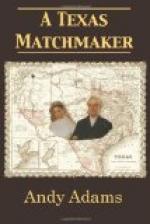Pasquale was a shallow-brained, clownish fellow, and after saddling up, as he led the coyote into the open to mount, he imitated a drunken vaquero. Tipsily admonishing the horse in Spanish to behave himself, he vaulted into the saddle and clouted his mount over the head with his hat. The coyote resorted to every ruse known to a bucking horse to unseat his rider, in the midst of which Pasquale, languidly lolling in his saddle, took a small bottle from his pocket, and, drinking its contents, tossed it backward over his head. “Look at that, Nate,” said Uncle Lance, slapping Mr. Wilson with his hat; “that’s one of the Las Palomas vaqueros, bred with just sense enough to ride anything that wears hair. We’ll look at those new hats this evening.”
In the fancy riding which followed, Pasquale did a number of stunts. He picked up hat and handkerchief from the ground at full speed, and likewise gathered up silver dollars from alternate sides of his horse as the animal sped over a short course. Stripping off his saddle and bridle, he rode the naked horse with the grace of an Indian, and but for his clownish indifference and the apparent ease with which he did things, the judges might have taken his work more seriously. As it was, our outfit and those friendly to our ranch were proud of his performance, but among outsiders, and even the judges, it was generally believed that he was tipsy, which was an injustice to him.
On the conclusion of the contest with the lance, among the thirty participants, four were tied on honors, one of whom was Theodore Quayle. The other contests being over, the crowd gathered round the lancing course, excitement being at its highest pitch. A lad from the Blanco was the first called for on the finals, and after three efforts failed to make good his former trial. Quayle was the next called, and as he sped down the course my heart stood still for a moment; but as he returned, holding high his lance, five rings were impaled upon it. He was entitled to two more trials, but rested on his record until it was tied or beaten, and the next man was called. Forcing her way through the crowded field, Miss Jean warmly congratulated Theodore, leaving Esther to my tender care. But at this juncture, my old sweetheart caught sight of Frances Vaux and some gallant approaching from the river’s shade, and together we galloped out to meet them. Miss Vaux’s escort was a neighbor lad from the Frio, but both he and I for the time being were relegated to oblivion, in the prospects of a Las Palomas man by the name of Quayle winning the lancing contest. Miss Frances, with a shrug, was for denying all interest in the result, but Esther and I doubled on her, forcing her to admit “that it would be real nice if Teddy should win.” I never was so aggravated over the indifference of a girl in my life, and my regard for my former sweetheart, on account of her enthusiasm for a Las Palomas lad, kindled anew within me.




